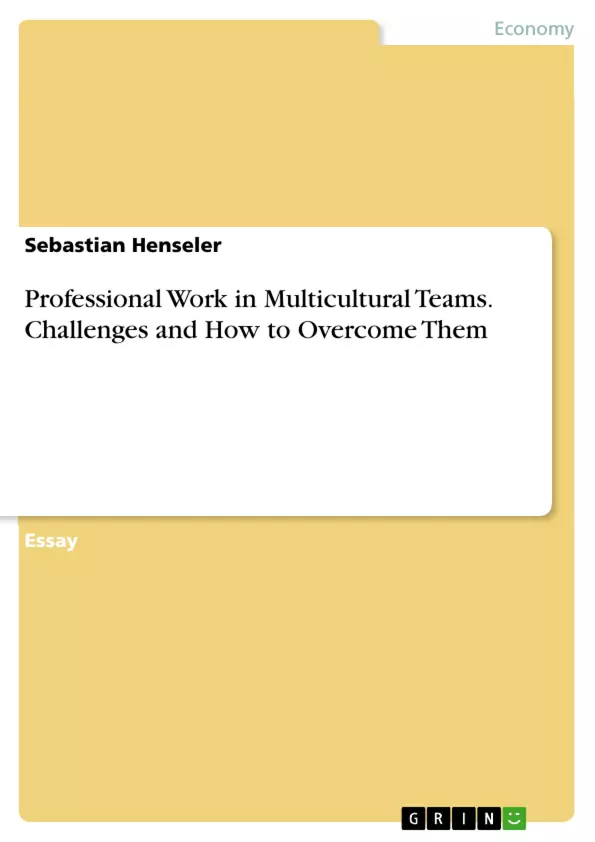The present paper is concerned with the classical challenges faced by employers working abroad. It aims to shed light on the research area of multicultural teams in a professional context.
This paper is divided into three thematically differentiated main areas. The first part is concerned with the evidence of the special importance of the research area of multicultural teams for research and practice
The second part deals with the description of typical and recurring problems and challenges of multicultural teams. Four potential sources of danger for efficient collaboration are identified and supported by practical examples.
The third part of this paper, then, deals with strategies that enable HR departments to develop the specific skills of multicultural teams used to avoid failure and frustration. Possible strategies are designed according to the challenges highlighted in section two identified and relate to their context.
Finally, the knowledge gained in the course of this work is summarized and the strategy with the greatest and most universal impact on the successful management of multicultural teams is highlighted.
Inhaltsverzeichnis (Table of Contents)
- Introduction
- The Importance of Multicultural Teams
- Success Potential of Multicultural Teams
- Challenges of Multicultural Teams
- Communicational Issues
- Hierarchy Norms
- Decision-Making Norms
- Rush to Structure
- Strategies for Managing Multicultural Teams
Zielsetzung und Themenschwerpunkte (Objectives and Key Themes)
This work examines the challenges of managing multicultural teams in a globalized business environment. It explores the importance of multicultural teams for organizational success, identifying key sources of potential conflict arising from cultural differences, and proposes strategies to mitigate these challenges.
- The growing importance of multicultural teams in global organizations
- The potential benefits and challenges of working in diverse teams
- Specific cultural differences that can lead to communication problems, misunderstandings, and conflicts
- The role of human resource management in supporting and managing multicultural teams
- Strategies for fostering successful collaboration and overcoming cultural barriers in multicultural teams
Zusammenfassung der Kapitel (Chapter Summaries)
The first part of the work discusses the importance of multicultural teams in today's global business environment. It highlights the unique success potential of these teams, including their ability to generate creative solutions, pool diverse knowledge, and respond to changing market demands.
The second part examines the challenges that multicultural teams face, focusing on four key areas: communication, hierarchy norms, decision-making norms, and the "rush to structure." Each section provides practical examples and evidence from research to illustrate how cultural differences can create obstacles to effective collaboration.
The third part focuses on strategies that human resource management departments can implement to overcome these challenges and foster successful collaboration in multicultural teams. The chapter explores different approaches to address the specific challenges outlined in the previous sections.
Schlüsselwörter (Keywords)
The primary focus of this work is on the management of multicultural teams in a globalized business environment. Key terms include: multicultural teams, cultural differences, communication, hierarchy, decision-making, human resource management, conflict, and strategies for collaboration. The work draws on research findings related to cultural dimensions, intercultural communication, and organizational behavior, providing a comprehensive overview of the complexities and potential of managing multicultural teams.
- Quote paper
- Sebastian Henseler (Author), 2019, Professional Work in Multicultural Teams. Challenges and How to Overcome Them, Munich, GRIN Verlag, https://www.grin.com/document/916314



